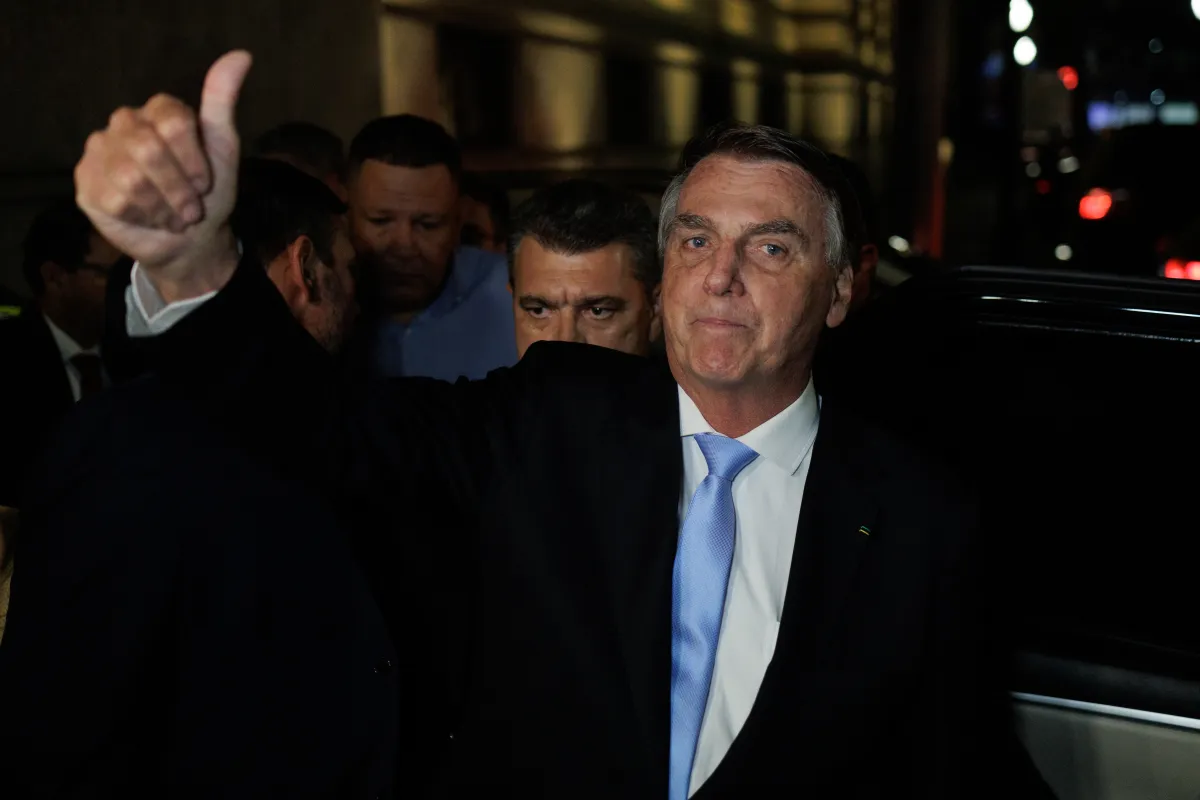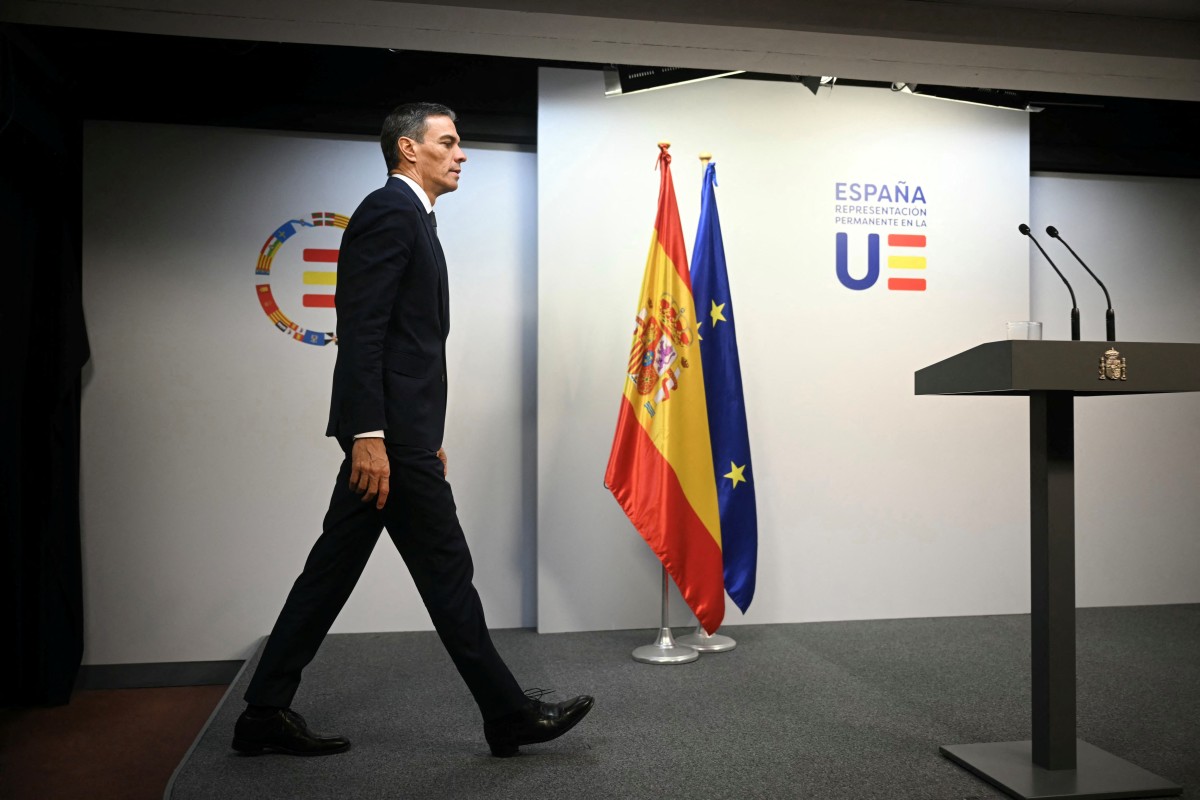International
Bolsonaro says he suffers “endless persecution” after a new judicial setback

Former Brazilian president Jair Bolsonaro affirmed that the alleged political persecution he suffers has no end, after the Superior Electoral Court (TSE) of Brazil rejected an appeal that he filed against a conviction that was imposed on him and that left him ineligible for eight years.
“Endless persecution. They maintained the electoral disqualification and the fine of 425,000 reais (about 85,000 dollars or 78,370 euros),” said the leader of the far right in Brazil in a message he posted on his social networks after the new judicial setback was known.
The captain of the Army reserve thus reacted to the decision of the president of the High Electoral Tribunal (TSE), magistrate Alexandre de Moraes, who rejected the appeal filed by Bolsonaro’s defense against one of the two convictions that prevent him from running for any public office until 2030.
In a decision that was published in the Official Journal of Justice, the magistrate denied the request of Bolsonaro’s defense for that conviction to be reviewed by the Supreme Court.
The leader of the far right seeks to reverse the sentence of October last year in which the Electoral Tribunal, by 5 votes in favor and 2 against, concluded that Bolsonaro and his candidate for vice president in the 2022 presidential elections, Walter Braga Netto, abused his economic and political power during the electoral campaign.
The magistrates considered that the two candidates turned the official commemorations for the Bicentennial of the Independence of Brazil, held in September 2022 and financed and organized by the State, into an act of electoral proselytism from which they tried to benefit.
Moraes, in his sentence, said he rejected the appeal of the former president’s defense for procedural inconsistencies and affirmed that Bolsonaro was not curtaied of the right to proper defense nor was he violated any constitutional right that justifies the case to be brought to the Federal Supreme Court.
The defense, which can still file an appeal before the highest court for it to analyze the case even without the endorsement of the electoral court, announced that this will be its next step.
“We deeply respect the decision of the electoral court, but, because we do not agree with its content, we will present the appropriate appeal at the right time,” the lawyers said in a statement.
In addition to this conviction, Bolsonaro was also declared ineligible for eight years by another decision of the electoral court, in June 2023, in which he was found guilty of abuse of political power and misuse of state media.
This conviction was for a meeting he convened with ambassadors from different countries, broadcast on state television, in which he questioned the reliability of Brazil’s electronic voting system.
International
Winter Storm Fern Leaves 30 Dead and Over One Million Without Power Across the U.S.

The massive winter storm Fern, bringing polar temperatures, battered large portions of the United States for a third consecutive day on Monday, leaving at least 30 people dead, more than one million households without electricity, and thousands of flights grounded.
In the Great Lakes region, residents awoke to extreme cold, with temperatures dropping below -20°C. Forecasts indicate that conditions are expected to worsen in the coming days as an Arctic air mass moves south, particularly across the northern Great Plains and other central regions, where wind chills could plunge to -45°C, temperatures capable of causing frostbite within minutes.
Across the country, heavy snowfall exceeding 30 centimeters in roughly 20 states triggered widespread power outages. According to PowerOutage.com, nearly 800,000 customers remained without electricity on Monday morning, most of them in the southern United States.
In Tennessee, where ice brought down power lines, approximately 250,000 customers were still without power. Outages also affected more than 150,000 customers in Mississippi and over 100,000 in Louisiana, as utility crews struggled to restore service amid dangerous conditions.
International
Spain approves plan to regularize up to 500,000 migrants in Historic Shift

In November 2024, Spanish Prime Minister Pedro Sánchez announced a reform of the country’s immigration regulations aimed at regularizing 300,000 migrants per year over a three-year period, in an effort to counter population aging in a country where births have fallen by 25.6% since 2014, according to official data.
Going against the trend in much of Europe, Spain’s left-wing government has now approved an exceptional migrant regularization plan that could benefit up to 500,000 people, most of them from Latin America.
The measure will allow the regularization of around “half a million people” who have been living in Spain for at least five months, arrived before December 31, 2025, and have no criminal record, Migration Minister Elma Saiz explained on public television.
The plan, approved on Tuesday by the Council of Ministers, establishes that applications will be processed between April and June 30, enabling beneficiaries to work in any sector and anywhere in the country, Saiz said.
“Today is a historic day for our country. We are strengthening a migration model based on human rights, integration, and one that is compatible with economic growth and social cohesion,” the minister later stated at a press conference.
The socialist government of Pedro Sánchez stands out within the European Union for its migration policy, contrasting with the tightening of immigration measures across much of the bloc amid pressure from far-right movements.
Central America
Honduras swears in conservative president Asfura after disputed election

Conservative politician Nasry Asfura assumed the presidency of Honduras on Tuesday with an agenda closely aligned with the United States, a shift that could strain the country’s relationship with China as he seeks to confront the economic and security challenges facing the poorest and most violent nation in Central America.
Asfura’s rise to power, backed by U.S. President Donald Trump, marks the end of four years of left-wing rule and secures Trump another regional ally amid the advance of conservative governments in Chile, Bolivia, Peru, and Argentina.
The 67-year-old former mayor and construction businessman was sworn in during an austere ceremony at the National Congress, following a tightly contested election marred by opposition allegations of fraud and Trump’s threat to cut U.S. aid if his preferred candidate did not prevail.
Grateful for Washington’s support, Asfura—who is of Palestinian descent—traveled to the United States to meet with Secretary of State Marco Rubio, before visiting Israeli Prime Minister Benjamin Netanyahu.
“We need to strengthen relations with our most important trading partner,” Asfura said after being declared the winner of the November 30 election by a narrow margin, following a tense vote count that lasted just over three weeks.
-

 Central America4 days ago
Central America4 days agoGuatemala’s president rules out negotiations with inmates after prison riots
-

 Central America1 day ago
Central America1 day agoGuatemala seizes over a ton of cocaine hidden in flour at Pacific port
-

 International4 days ago
International4 days agoTrump-Era Defense Plan Prioritizes Border Security and Scales Back Global Commitments
-

 Internacionales4 days ago
Internacionales4 days agoMajor winter storm threatens “catastrophic” ice and snow across much of the U.S.
-

 International4 days ago
International4 days agoBogotá and Quito Seek Dialogue After Tariffs and Power Cut Escalate Tensions
-

 International4 days ago
International4 days agoGuatemala considers sending high-risk gang members to military prisons
-

 International3 days ago
International3 days agoDelcy Rodríguez seeks political agreements after Maduro’s ouster
-

 International1 day ago
International1 day agoHistoric snowstorm paralyzes Toronto after 60 centimeters of snow
-

 International1 day ago
International1 day agoSpain’s irregular migrant population rises to 840,000, study finds
-

 International3 days ago
International3 days agoFederal immigration agents kill man in Minneapolis, sparking protests and outrage
-

 International4 days ago
International4 days agoRights group says over 5,000 killed in Iran protests, mostly civilians
-

 International1 day ago
International1 day agoRights group says nearly 6,000 killed in Iran protest crackdown
-

 Central America8 hours ago
Central America8 hours agoGuatemala Police Arrest Prison Guard Caught in the Act of Extortion
-

 International8 hours ago
International8 hours agoDoomsday clock moves to 85 seconds before midnight amid rising global risks
-

 International1 day ago
International1 day agoVenezuela frees at least 80 political prisoners, NGO says
-

 International8 hours ago
International8 hours agoWinter Storm Fern Leaves 30 Dead and Over One Million Without Power Across the U.S.
-

 Sin categoría8 hours ago
Sin categoría8 hours agoEight Killed in Series of Armed Attacks in Ecuador’s Manabí Province
-

 International1 day ago
International1 day agoEU launches new probe into X over AI-generated fake nude images
-

 Central America8 hours ago
Central America8 hours agoHonduras swears in conservative president Asfura after disputed election
-

 International8 hours ago
International8 hours agoSpain approves plan to regularize up to 500,000 migrants in Historic Shift
-

 Central America8 hours ago
Central America8 hours agoBukele leads public trust rankings as UCA survey highlights gains in security
-

 Sin categoría8 hours ago
Sin categoría8 hours agoEl Salvador Launches Fourth Year of Ocean Mission to Protect Marine Ecosystems
-

 International1 day ago
International1 day agoSevere winter storm grips U.S., leaves multiple dead as extreme cold persists
-

 International1 day ago
International1 day agoFrance debates ban on social media for children under 15


























